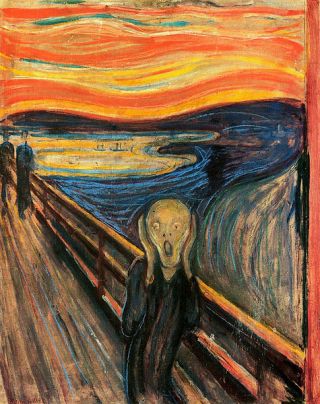Neuroticism
How Do You Deal With Despair?
How do you handle the latest horror human beings have inflicted upon each other?
Posted August 1, 2014

What do you do in your moments of despair upon hearing or seeing the latest horror human beings have inflicted upon each other—in your own neighborhood or thousands of miles away from it? Sometimes, what happens for me is a certain phrase or two will “pop into my head” and ground me, by which I mean allow me to locate the horrific events in the contradictory totality of human history and its dialectic with human society, in the human capacity to continuously overthrow (re-create) that which we have created. One of these phrases is a quote from the Soviet psychologist Lev Vygotsky: “A revolution solves only those tasks raised by history.” Another is from French cultural theorist Sylvère Lotringer: “One does not cure neurosis, one changes a society which cannot do without it.” And a third was spoken by Dr. Martin Luther King, Jr.: “The salvation of our world lies in the hands of the maladjusted.” Each of these propositions speaks to me in the performative—“Don’t mourn, organize!” They convey not a critical but a practical-critical approach to politics and psychology.
In 2003 Fred Newman and I wrote an article entitled, “All Power to the Developing,” that appeared in the Annual Review of Critical Psychology. There we presented a picture of our practical-critical psychotherapy (and our politics) by foregrounding its debt to Marx’s humanism—by which we meant his insistence on the sociality of human beings and, in particular, his conception of revolutionary activity. In our discussion of social therapy, which was created by Newman, we focused on its activity of relating to all people as revolutionaries:
Because we believe, with Marx, that 1) a fundamental human characteristic is being capable of carrying out revolutionary activity and 2) that carrying out revolutionary activity is necessary for ongoing individual and species development, we relate to people as revolutionaries. This feature of social therapy was first articulated in 1986 at the Congress of the Interamerican Society of Psychology, held in the Karl Marx Theater in Havana, Cuba:
We speak of social therapy as revolution for non-revolutionaries. This radical Marxist conception – that the fundamental or essential human characteristic is being capable of carrying out revolutionary activity (what Marx calls practical-critical activity)—that’s the foundation of anything which can be called or should be called a Marxist psychology. Ours is a radical insistence that we not accommodate reactionary society by relating to people—any people—as anything but revolutionaries. (Newman, 1991p.15)
Relating to patients as revolutionaries entails relating to them as world historic in everyday, mundane matters, that is, as social beings engaged in the life/history-making process of always becoming (assimilating “all the wealth of previous development”). For what is history/making history if it is not the dialectic what is/what is becoming? It was Vygotsky who gave us a way to actualize Marx’s dialectical understanding of history/making history in the service of helping people relate to themselves (that is, practice, or perform) as revolutionaries.
It is now 2014, more than a decade since that article appeared. Over these years, Newman and I continued to work together, until he passed away in 2011—organizing, writing and expanding the environments and activities that relate to people as revolutionaries. The desire to learn our approach increases worldwide; I think that a critical stance toward the world’s conflicts is frustrating for more and more people who want to do something about them and that they want to be practical-critical. At the same time, the bureaucracy and institutionalization of the so-called helping professions of psychology, counseling, social work, psychiatry and psychotherapy have become more oppressive and harder and harder to get around. The medical and natural science model of understanding and relating to human beings is so dominant that non-mainstream approaches including social therapy, are rarely taught in universities or professional schools. That, plus the fact that there are 7 billion people on the planet, means that we have a long, long way to go!
The performance continues.


